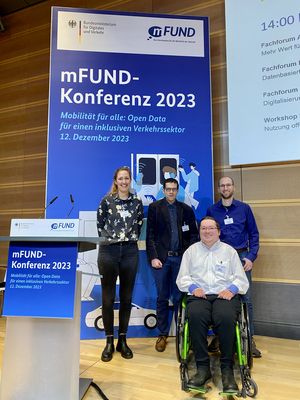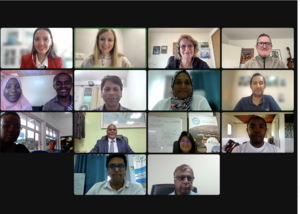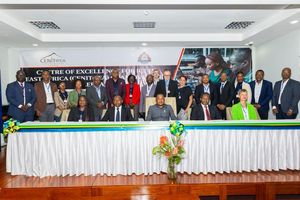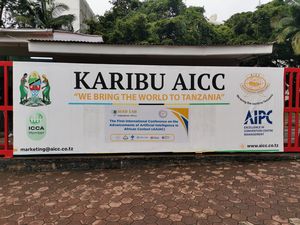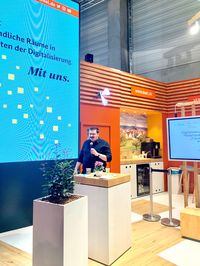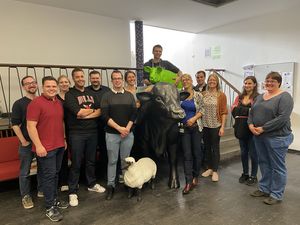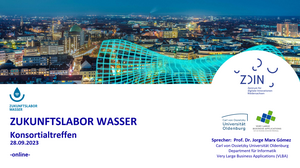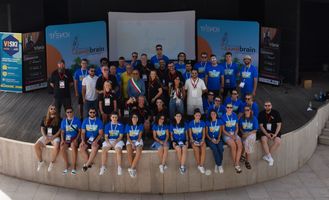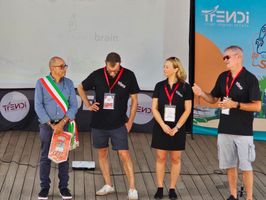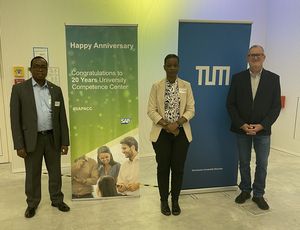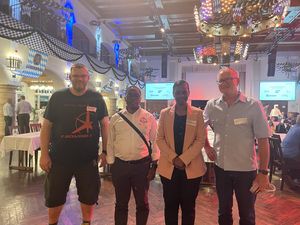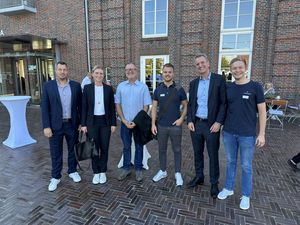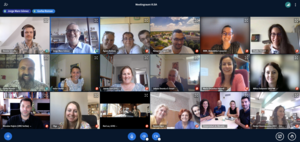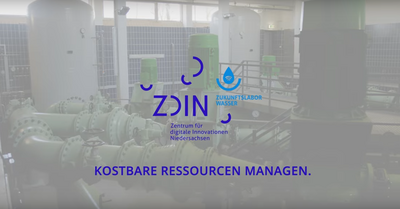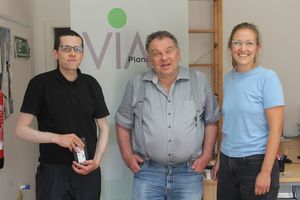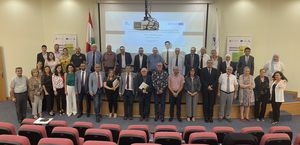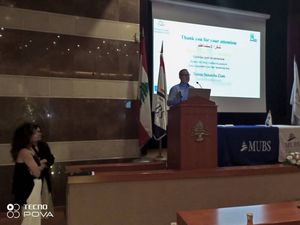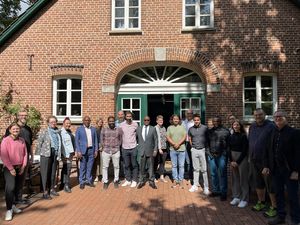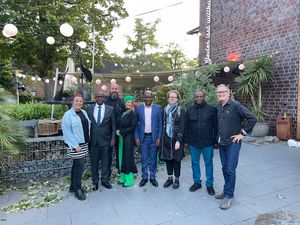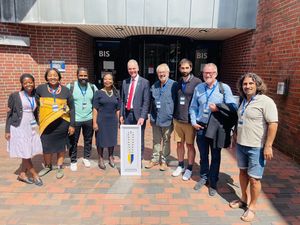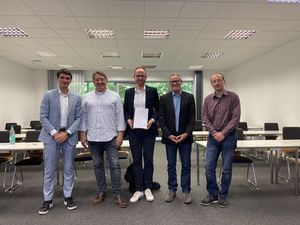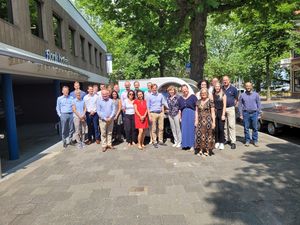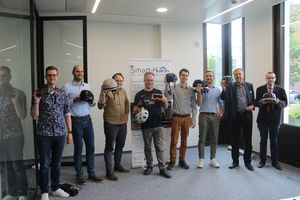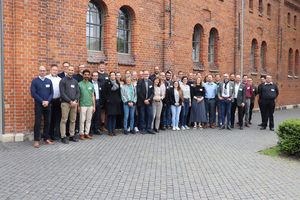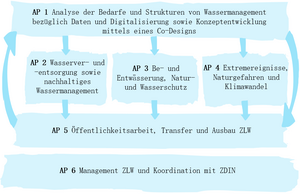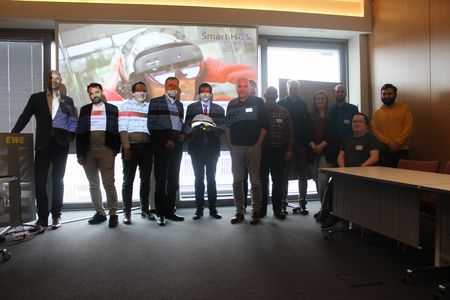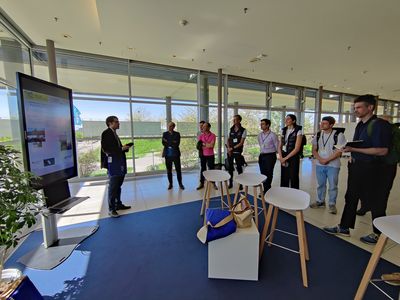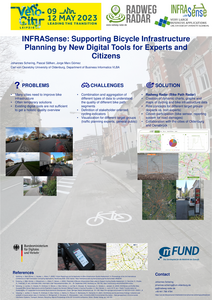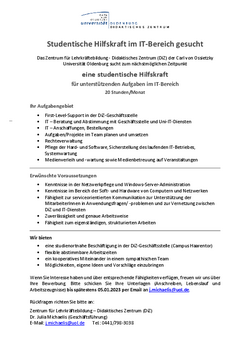2023
2023
News 2023
13.12.2023: INFRASense präsentiert aktuelle Ergebnisse zur Radwegebewertung auf der mFUND Konferenz
Der Austausch mit ähnlich gelagerten Forschungsprojekten stellt einen wichtigen Aspekt der wissenschaftlichen Tätigkeit dar. Um verschiedene datengetriebene Vorhaben zur Mobilität der Zukunft zusammenzubringen, organisiert das Bundesministerium für Digitales und Verkehr (BMDV) daher jährlich die mFUND Konferenz. Das laufende Projekt INFRASense, das unter Mitwirkung der VLBA eine datenbasierte Bewertung der Radwegequalität zum Ziel hat, war auf der diesjährigen Konferenz im dbb Forum in Berlin ebenfalls mit einem Vortrag vertreten. Die Vertreter:innen von INFRASense präsentierten den aktuellen Projektstand und diskutiererten mit weiteren Projekten aus dem Smart Cycling Bereich weiterführende Ansätze.
Das Fachforum A2 „Mehr Wert für Radverkehrsdaten: Von der Bewertung von Infrastruktur bis zur Auswertung subjektiver Sicherheit“ bot dabei eine passende Plattform für den interdisziplinären Austausch. In dem Vortrag ging Kathrin Krienke (Planungsbüro VIA) auf die Relevanz einer einheitlichen Radwegebewertung für Entscheider:innen aus der Radverkehrsplanung ein. Dr. Daniel Schlitt (worldiety) präsentierte den BIQEmonitor, der fahrtrelevante Qualitätsmetriken basierend auf Sensormessungen von Radfahrenden visuell darstellen kann. Pascal Säfken und Johannes Schering (VLBA) gingen auf den Radweg Radar und die Ergebnisse der studentischen Projektgruppe INFRASense ein. Das Dashboard integriert neben den Qualitätsmetriken viele weitere relevante Datenquellen und Kennzahlen, die den Planungsprozess weiter unterstützen können (Verkehrsdaten, Unfälle, Streckenbeschaffenheit), und liefert somit weiterführende Informationen für die Maßnahmenentscheidung bei der Verbesserung des Radwegenetzes.
Die weiteren Projekte aZuR – Automatisierte Zustandserfassung der Radwegeinfrastruktur, ABPA - Konzeptentwicklung und Umsetzung eines Systems zur automatisierten Analyse der Beschaffenheit von Radwegen und ESSEM - Emotionswahrnehmung für (E-)Fahrradsicherheit und Mobilitätskomfort erfassen die Oberflächenbeschaffenheit mittels Lidar-Sensorik, bestimmen die Radwegequalität mit KI Ansätzen auf Basis von Handydaten oder realisieren die Messung von Stress der Radfahrenden. Hier ergeben sich spannende Schnittmengen, die in der abschließenden Diskussion in einem gemeinsamen Podium vertieft wurden. Insgesamt müssen in den kommenden Jahren noch große Anstrengungen unternommen werden, damit Deutschland endlich Fahrradland werden kann. Auf diesem Weg besteht weiterer Forschungsbedarf für datenbasierte Fahrradprojekte.
Die insgesamt siebte mFUND-Konferenz, die von Bundesverkehrsminister Dr. Volker Wissing offiziell eröffnet wurde und in diesem Jahr unter dem Motto „Mobilität für alle: Open Data für einen inklusiven Verkehrssektor“ stand, ist ein Schaufenster für neue Formen der Datennutzung im Verkehrssektor. Neben der finanziellen Unterstützung stehen im mFUND auch der Wissensaustausch und die aktive Vernetzung der Fördernehmerinnen und Fördernehmer aus Verwaltung, Wissenschaft und Wirtschaft im Fokus. Die jährliche mFUND-Konferenz bietet dafür ein ideales Forum. INFRASense wird mit ca. 1,2 Mio. Euro im Rahmen des mFUND Förderprogramms noch bis Ende Oktober 2024 gefördert.
11.12.2023: First Kickoff-Meeting of HEIBlue
05.12.2023: VLBA meets Eggersmann GmbH
On December 5, a meeting was held at the Wardenburg site between Prof. Dr.-Ing. Jorge Marx Gómez and other representatives of VLBA and colleagues from Eggersmann GmbH to hold initial talks about a possible cooperation. During the meeting, the importance of coherent enterprise architecture management for a continuously growing company was emphasized. This is particularly important as the requirements from operational processes, especially in connection with an enterprise resource planning system, are extremely diverse and must always be taken into account in strategic planning.
The VLBA appreciates the informative insights into a company with a focus on special machines in the field of conversion technology and looks forward to further enriching discussions and possible cooperation.
20.11.2023: Blockchain Week
Last week, Blockchain Week took place at the UOL, organized by the University Group of Foreign Students (HGAS).
As part of this series of events, the VLBA also reported on its current research projects and research work on blockchain and digitalization.
We would like to thank the HGAS representatives for the great organization and are already looking forward to the next event!
18.11.23: Cenit@EA 6th Anniversary Celebration
Covering the 17th and 18th of November 2023, the final meeting on the collaboration between the Carl von Ossietzky University of Oldenburg and the Nelson Mandela African Institution of Science and Technology (NM-AIST) took place. Topic has been the celebration of the achieved milestones as well as discussions about sustainable digital advancements in the East African region.
Brought to life by the Federal Ministry for Economic Cooperation and Development (BMZ) and the East African Community (EAC) has the Centre of Excellence for ICT in East Africa (Cenit@EA) been founded in 2019, in order to support NM-AIST with the implementation of the masters study program “Embedded and Mobile Systems (EMoS)”. Supported by the Gesellschaft für internationale Zusammenarbeit (GIZ), the German Academic Exchange Service (DAAD) and the Inter-University Councel of East Africa (IUCEA), the project was able to help 112 students reach their masters degree after completing of the second phase of the dSkills@EA-Project.
To celebrate these successes all partners have met in the Mt. Meru hotel in Arusha, Tanzania for two days. A special guest has been the representative Tanzanian Minister of Education Omary Juma Kipanga. His Attendance shows the importance of the project for the East African region.
In the two days of the event representatives from all participating institutions have spoken on stage. There have been multiple panel discussions regarding the future course of the project and even a few of the students shared their experience with the EMoS – study. Further more there have been poster presentations from the students, in order to discuss scientific research.
The funding phase ends with the 31.12.23 and now the focus is on perpetuating the support for the center in the future. This is why all participating universities (UOL, NM-AIST, KAB, MU, UB, UDSM, UTAB and UOJ) have been signing a memorandum of understanding on stage to secure the efforts made.
All in the all the event can be called a full success.
16.11.2023: First International Conference on the Advancements of Artificial Intelligence in African Context (AAIAC)
On the 15th and 16th November of 2023, the first International Conference on the Advancements of Artificial Intelligence in African Context (AAIAC) took place in Arusha, Tanzania. The theme was the “Role of Artificial Intelligence towards the realization of the 4thand 5th Insdustrial Revolution”. The Goal of the conference was to bring Researchers and Industry Partners together to discuss the Chances and Possibilities of AI in Africa.
There have been many speeches regarding the use of AI, where researchers presented their developed solutions, e.g. in the field of agriculture or healthcare.
Professor Dr.-Ing. Jorge Marx Gómez was presenting a key note at the conference as well, with a few examples from the VLBA regarding the Research of AI, for example the use of federated learning.
A special guest attending the conference was the Tanzanian minister for education, Science and Technology: Omar J. Kipanga. His attendance shows the importance of the conference for the east-african region.
09.11.2023: Smart Country Convention
This year's Smart Country Convention took place in Berlin from 07.11-09.11 2023.
A wide range of providers, authorities, federal states, municipalities, and ministries came together at the trade fair for smart city, smart country and e-government solutions to discuss and define the digital transformation of the public sector.
Our colleague Hauke Precht was there to talk about the research project and future region Transparency in Pig Production (TiPP) at the booth of the Federal Ministry of Food and Agriculture Germany.
The focus was on communicating the vision and goal of the project and reporting on the initial approaches and experiences of the first months of the project.
Further information on the TiPP project can also be found on the website of the Lower Saxony Chamber of Agriculture.
01.11.2023: CENTOS Postershow
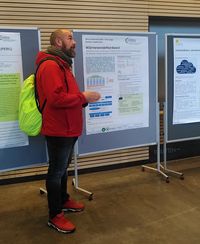
On 01.11.2023 the poster show of the Oldenburg Center for Sustainability Economics and Management (CENTOS) took place in the lecture hall building (A14) of the University of Oldenburg. Sustainability projects were presented to the students at the poster show. Sven Lampe from the VLBA department presented the Wärmewende Nordwest project. Interested students had the opportunity to ask questions about the projects and identify opportunities to get involved in the project design as part of their final theses.
13.10.2023: VLBA at EnviroInfo23
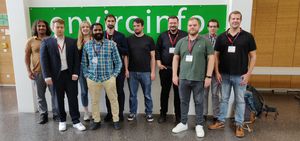
From 11th October 2023 to 13th October 2023, the EnviroInfo took place at the Leibniz Computing Center in Garching, where seven staff members from the VLBA participated. During this event, the submitted scientific papers were presented. Ali Akyol presented his paper entitled "Determination of Citizen Groups and Added Value for a Daily-Integrated Environmental Information Portal". Rami Chahin and Ali Akyol jointly presented the paper titled "Development of a Smart Farming Dashboard Based on 5G Mobile Data". Marius Wybrands presented the scientific paper titled "Proof of Concept: Local Precipitation-Dependent Stormwater Management with Smart Water Tanks". Hauke Precht presented the paper "Digitalization of the Value Chain Pig Production - Discussion of Novel Approaches and Application of Self-Sovereign Identity", co-authored with Paula Bürmann. Timothy Musharu contributed to the conference by presenting his paper "Developing a Digitization Dashboard for Industry-Level Analysis of the ICT Sector." Johannes Schering presented a paper on "Data Management of Heterogeneous Bicycle Infrastructure Data" and, together with Richard Schulte, a business informatics student, presented a paper entitled "The Bike Path Radar: A Dashboard to provide new information about Bicycle Infrastructure Quality."
The participation of these researchers and the presentation of their work at the EnviroInfo conference contributed to a professional exchange. The conference provided a valuable platform to exchange ideas and discuss innovative solutions. For more information on the conference, please visit the website (https://www.enviroinfo2023.eu/).
28.09.2023: TiPP Project Workshop
On September 28, 2023, all consortium partners of the TiPP project met at the Tierärztliche Hochschule Hannover (University of Veterinary Medicine Hannover) for a project workshop. The aim of the workshop was to consolidate the goals of the project and to define the next steps to take to reach the defined goal. To this end, the University of Oldenburg (VLBA), together with OFFIS, gave a keynote speech on the topic of blockchain and SSI, and TIHO gave a keynote speech in the context of labels for pork. In addition to the professional exchange, a short tour of the TIHO campus was also on the agenda.
For further information please see project website of the Lower Saxony Chamber of Agriculture (https://www.lwk-niedersachsen.de/lwk/projekte/537_TiPP ) or from the VLBA (https://uol.de/vlba/projekte/tipp )
28.09.2023: Consortium meeting of the "Zukunftslabor Wasser" project
On September 28, 2023, the members of the consortium of the project "Zukunftslabor Wasser" (ZLW; "Future Laboratory Water") as well as interested partners from practice met online for an exchange. On this afternoon, representatives of public utility companies, technology manufacturers, service providers, engineering offices, authorities and associations gave an insight into their activities with regard to the resource water. For a deeper insight into the project ZLW, the current project status as well as planned work was reported by project members. Lively discussions promoted the intensive exchange and especially the identification of further possibilities of cooperation.
Central aspects of the Future Laboratory Water are the use of intelligent systems and new digital methods in water management with regard to the security of supply and quality of the resource water.
The Future Lab Water is located at the Center for Digital Innovations Lower Saxony (ZDIN), the speaker institution is the University of Oldenburg. The project is funded by the Lower Saxony Ministry of Science and Culture and the Volkswagen Foundation for a total duration of 5 years.
Project duration: 10/2022 - 09/2027
Funded scientific institutions:
- Carl von Ossietzky University of Oldenburg
- Leibniz University Hannover
- Technical University Braunschweig
- University of Osnabrück
- Leuphana University Lüneburg
- Ostfalia University of Applied Sciences
- Technical University Clausthal
- Jade University of Applied Sciences
- German Research Center for Artificial Intelligence (DFKI GmbH)
22.09.2023: SANDbrain Summer School in Badesi, Sardinia, Italy
From 17.09.2023 to 22.09.2023 the SANDbrain Summer School took place in Badesi, Sardinia, Italy. The theme of the Summer School was IT, Entrepreneurship and Sports. The students had the task to develop projects and ideas that make the community work of the sports club Dinamo Fondazione from Sassari more visible or from which new initiatives of the sports club are formed. Emphasis was placed on environmental aspects, as well as on fundraising. The process was accompanied by six workshops and enriched by presentations of the participating institutions. At the end of the Summer School, the three groups presented their results to the sports club in the form of a pitch and received feedback from the club. At the end, there was an event organized by the community with live music and a buffet, which provided an opportunity for further exchange between the participants from all countries.
The students were supported by funds from the Barthel Foundation, study quality funds and the PROMOS scholarship.
12.09.2023: SAP Academic Community Conference 2023 (D-A-CH)
From September 11-12, 2023, the SAP Academic Community Conference 2023 (D-A-CH) with the 20th anniversary of the SAP UCC took place at the TU Munich. There was a lively exchange between participants and organizers during the community sessions and workshops (conference proceedings of the SAP ACC 2023).
Organized by Prof. Dr.-Ing. Jorge Marx Gómez (Carl von Ossietzky University Oldenburg) and Prof. Dr. Uta Mathis (Esslingen University of Applied Sciences), this year's conference featured an "International Workshop" for the first time, which focused on teaching SAP content and networking with a special focus on African partners. In the workshop, special requirements for teaching, e.g. infrastructure, learning formats, which are necessary for teaching at universities in the sub-Saharan region, were discussed.
From the dskills@EA-CENIT@EA project, Dr. Ing. Judith Leo and Dr. Michael Emanuel Haule participated in the workshop as representatives of the Nelson Mandela African Institution of Science and Technology (NM-AIST) in Arusha, Tanzania, and expressed their needs and findings. We hereby thank all those who contributed to the success of the workshop.
08.09.2023: Opening event IQON on September 8, 2023 in the old Fleiwa
During the opening event of the Innovation Quarter Oldenburg (IQON), the Department of Business Informatics / VLBA together with colleagues from Wolfsburg presented two of their previous research collaborations: DIfA – Data Intelligence for Audit as well as TRACE – Processing and Analysis of Digital Traces of Market Entities.
07.09.2023: Kickoff Meeting for research project AI@Smile
On Thursday, September 7th, the kick-off meeting of the AI@Smile project took place. The participating partner organisations from different parts of Europe met in a virtual meeting room to get to know each other and to discuss the process and the goals of the project, which was officially launched in September.
AI@Smile aims to preserve the mental health of teenagers and to counteract the rising suicide rate in this age group. Among other things, this goal aims to be achieved with the help of AI-supported solutions for the early detection of warning signals and the direct involvement of teachers and parents.
The various partner organisations are located in Spain, Greece, France, Serbia, Hungary and Turkey
22.08.2023: Digitalisierung des Wassersektors – Video über das Projekt „Zukunftslabor Wasser“ erklärt aktuelle Forschung
Das Zukunftslabor Wasser untersucht die Potenziale der Digitalisierung für ein effizientes und nachhaltiges Wassermanagement. In Folge des Klimawandels nehmen Extremsituationen wie Überflutungen und Dürren zu. Ein steigender Wasserbedarf der Gesellschaft und der Wirtschaft stellen zusätzliche Herausforderungen an das Wassermanagement. In einem anschaulichen Video erklären die Wissenschaftler*innen des Zukunftslabors, wie digitale Innovationen dazu beitragen können, die wertvolle Ressource Wasser zu schützen, die Wasserversorgung aufrechtzuerhalten und Extremereignissen effizient zu begegnen.
Welche digitalen Innovationen kommen dabei ins Spiel und wie wird sich die Nutzung von Wasser zukünftig verändern? Alle Details erfahren Sie im Video „Digitalisierung des Wassersektors: Kostbare Ressourcen managen“, das auf der der YouTube-Seite des Zentrums für digitale Innovationen Niedersachsen (ZDIN) zu finden ist.
19.07.2023: Besuch bei Planungsbüro VIA
Im Rahmen des Forschungsprojektes INFRASense, das die Entwicklung eines Bewertungsschemas für die Radinfrastruktur zum Ziel hat, erfolgte kürzlich ein Besuch bei Praxispartner Planungsbüro VIA in Köln. Das Büro bringt im Projekt seine Expertise bei Radwegebau bzw. –planung mit ein und liefert alle fachlichen Anforderungen für die Qualitätsbewertung. Der Entwicklungsprozess wird durch die Planungsexpert:innen, die derzeit u.a. an der neuesten Überarbeitung der Empfehlungen für Radverkehrsanlagen (ERA) federführend mitarbeiten, während der gesamten Projektlaufzeit fachlich begleitet.
Der erste Teil des Besuchs am Mittwoch, 19. Juli, bestand aus einer einer Befahrung der Radinfrastruktur. Die knapp 60 Kilometer führten u.a. durch die Kölner Stadtteile Mülheim, das Stadtzentrum (inkl. Domplatte), Zollstock, Ehrenfeld, Böcklemünd und Müngersdorf. Auf der Strecke finden sich verschiedenste Radwegtypen (Fahrbahnführung, begleitender Geh- und Radweg, Protected Bike Lane) in sehr unterschiedlichem Zustand. Nach Aussage von Peter Gwiasda hat die Stadt Köln beim Radwegebau gute Fortschritte erzielt, was sich auch in den Ergebnissen des neuesten ADFC Fahrradklimatests widerspiegelt.
Nach Beendigung der Fahrradtour erfolgte der eigentliche Besuch bei Planungsbüro VIA, das in unmittelbarer Nähe zum Kölner Dom zu finden ist. Kathrin Krienke und Peter Gwiasda gaben Einblick in die aktuellen Projektarbeiten. Die aktuell entwickelten Qualitätskriterien, die im Projekt zur Anwendung kommen, wurden gemeinsam diskutiert. Zu der Auswertung der Fahrten aus Köln konnten die beiden Fachexpertinn:en ebenfalls direkt eine erste Einschätzung geben. Abschließend erhielten Kathrin und Krienke und Peter Gwiasda mehrere projekteigene Fahrradsensoren von VLBA Mitarbeiter Johannes Schering, die sie in nächster Zeit für eigene Fahrten vor Ort selbst nutzen wollen, damit weitere Analysen zur Infrastrukturqualität in der NRW Großstadt am Rhein möglich sind.
20.07.2023: Final MORALE project meeting in Beirut
From July 11 - 14, 2023, the final MORALE project meeting took place in Beirut (Lebanon) at the Beirut Arab University (BAU) in the presence of the university management of the participating partner universities and all project partnership officers. MORALE is a project funded by the ERASMUS+ program of the EU. It aims to build the capacity of Syrian and Lebanese universities to train a new generation of highly qualified professionals in the management and work of NGOs to promote the integration of refugees and the reconstruction of society in the southern Mediterranean.
13.07.2023: NEWW Kick-off Meeting
From 05-07.03.2023 the kick-off meeting for our new DAAD project NEWW - Network for Labour-Market oriented Education in Waste and Water Management for the Sub-Saharan Region - took place in Oldenburg.
The Network for Labour-Market oriented Education in Waste and Water Management (NEWW) is made up of the University of Oldenburg (UOL) with its Centre of Environmental and Sustainability Research COAST and the Future Water Lab in Germany, the University of Ghana (UG) in Ghana and the University of Arts and Technology Byumba (UTAB) in Rwanda and their 7 business partners. Together, the network will address the obstacles, market failures but also potentials impacting labour market stability in the target sectors Water and Waste in Ghana and Rwanda. Country-specific insights will be incorporated into practice-oriented teaching and up-skilling activities on the overarching topic of circular economy in waste and water management.
On the first day, all project and business partners met at the university's guest house to get to know each other and to define the goals and joint activities for the 3.5-year project. On the second day, we were able to visit the Water Treatment Plant of the OOWV in Donnerschwee and the Resource Center of the city of Oldenburg with our project partners from Ghana and Rwanda. The last day was dedicated to the internal planning of the project.
07.07.2023: VLBA joins celebration of UOL-NMU anniversary
Last week, the University of Oldenburg and Nelson Mandela University of Gqeberha, South Africa, South Africa came together in Oldenburg to commemorate a remarkable milestone: 25 years of fruitful cooperation between the two institutions. The event, filled with dialogue and inspiration, served as a platform to reaffirm their commitment to collaboration and set ambitious goals for the next five years. Representatives from both universities gathered in Oldenburg to reflect on their achievements and pave the way for a future marked by increased engagement, diversity, and sustainable development.
The Department of Business Information Systems (VLBA) over the years has established several notable initiatives and programs with NMU, especially their Department of Computer Sciences.
One of the key collaborations between the institutions was the Higher Education for Sustainable Development Hub (HEdIS), a joint initiative involving NMU, the University of Cape Town (UCT), and the VLBA department at UOL. HEdIS aimed to address major Sustainable Development Goals (SDGs) by developing teaching modules and organizing workshops, courses, and summer schools. This collaborative endeavor was funded by DAAD carried out from 2017 to 2022, demonstrating the institutions' dedication to fostering sustainable practices and solutions.
In the field of environmental management information systems, the Department and NMU joined forces with partner institutions in Ghana and Mozambique for the Development of Environmental Management Information Systems (DEMIS) project. This international doctoral degree program and network successfully supported nine students in obtaining their PhD degrees. DEMIS was likewise funded by DAAD and spanned from 2015 to 2017, emphasizing the significance of cross-cultural collaboration in advancing environmental research and knowledge.
Furthermore, the Developing and Strengthening Industry-driven Knowledge-transfer between developing Countries (DASIK) project brought VLBA and NMU together. Focusing on research areas such as Business Process Modeling, Corporate Environmental Management Information Systems, and Mobile Commerce, DASIK facilitated knowledge exchange and industry-driven research from 2012 to 2014.
As the collaboration between VLBA and Nelson Mandela University moves forward, the future holds immense promise. The two institutions are poised to deepen their partnership, expand their research endeavors, and advance innovative educational programs. With a shared commitment to sustainability, diversity, and societal impact, they will continue to push the boundaries of knowledge, drive positive change, and inspire the next generation of researchers and educators.
04.07.2023: Disputation Christoph Schröer
26.06.2023: LIHYP kick-off meeting
Groningen, 22nd of June 2023. On Wednesday June 21st and Thursday June 22nd, the project partners from the North Sea region meet in Groningen for the kick-off: The project LIHYP - Linking Hydrogen Power Potential has officially started. The project is funded by the EU within the framework of the Interreg 6B North Sea programme.
LIHYP brings hydrogen demand-supply and stakeholders together and raises potential for future aligned collaboration. The project initiates opportunities to accelerate market introduction of hydrogen applications, leading to regional hydrogen value chains connected in the North Sea Region. The project will realise different pilots for the use of hydrogen such as hydrogen cargo bikes, hydrogen driven freight train, hydrogen bus station and living labs in the Netherlands, Belgium, Denmark, France and Germany. A North Sea Region hydrogen platform marketplace will be held up for linking relevant stakeholders and a solid database for demand, production and supply of hydrogen will be created. Different Roadmaps for business modelling will help entrepreneurs, investors and public authorities to plan hydrogen in the North Sea Region. Together all partners will take first steps for cross-border system integration for hydrogen infrastructures, harmonization and standardization.
18.06.2023: SmartHelm discusses final results with BMDV and TÜV Rheinland
With the end of the project, the partners of the interdisciplinary SmartHelm project met for the official final meeting in Bremen. The coordinating company RYTLE GmbH invited the partners to Bremen in the Überseestadt on Wednesday, 14th of June 2023. Representatives of the German Federal Ministry of Transport and Digital (BMDV), TÜV Rheinland and the Federal Office for Logistics and Mobility (BALM) participated online.
The project partners RYTLE, University of Bremen (CSL), University of Oldenburg (VLBA), UVEX, TeamViewer and the city of Oldenburg presented their results in this order. As part of SmartHelm, several smart bicycle helmets that can successfully detect distractions in real road traffic using EEG and eye-tracking measurements were developed. The helmet was also tested in the context of parcel delivery in bicycle logistics and evaluated with the study participants regarding the usability (e.g. wearing comfort). The resulting data was published in the Open Data portal of the Ministry, the Mobilithek, and can be visualized on the SmartHelm Visualization Dashboard that was developed for this purpose. The city of Oldenburg conducted various formats to make the complex SmartHelm system understandable to the interested public.
All planned project goals could be reached successfully. The subsequent discussion with the project sponsor und the Ministry focused primarily on further using scenarios of the helmet and further research topics after the project end. So far, only different types of distractions (mental, visual, acoustic) can be recognized on the bike. An investigation of the dividing lines or transitions between stress and simple distractions as well as the specific background of these could be interesting for the future. The data management could be expanded to include additional health-specific characteristics in order to be able to monitor professional athletes even more precisely in their training progress. The concluding discussion showed that there is still a lot of potential for innovation when it comes to smart helmets and attention detection in road traffic.
We would like to take this opportunity to thank the BMDV's mFUND program for the funding that has made the implementation of the exciting SmartHelm project possible over the past 3.5 years. The last step of the project is the final report, which will be prepared and published in the coming months.
15.06.2023: Project NEWW approved by DAAD
The DAAD has selected the project "NEWW - Network for Labour-Market oriented Education in Waste and Water Management", developed by the VLBA, within the framework of the project call "Praxispartnerschaften zwischen Hochschulen und Unternehmen in Deutschland und in Afrika 2023-2026". The kick-off meeting will take place from 05.07. - 07.07.2023 in Oldenburg. Guests of the partner universities from the University of Technology and Arts of Byumba in Rwanda and the University of Ghana in Ghana are expected. The project was announced by the DAAD and funded by the German Federal Ministry for Economic Cooperation and Development.

15.-17.5.2023: On-site-visit as part of the EU Erasmus+ Project MORALE
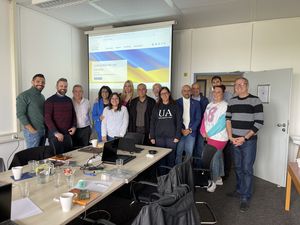
As part of the EU Erasmus+ project MORALE (Capacity building for curricula modernization of Syrian and Lebanese HEIs and lifelong learning provision: towards sustainable NGOs management and operation
with special focus on refugees) took place from 15.-17. May 2023 the on-site visit at the University of Oldenburg will take place. MORALE is a project funded by the ERASMUS+ program of the EU. It aims to build the capacity of Syrian and Lebanese universities to train a new generation of highly qualified professionals in the management and work of NGOs to promote the integration of refugees and the reconstruction of society in the southern Mediterranean. Participants were colleagues from all participating partner universities as well as Oldenburg NGOs (Diakonie, youth migration service, Pro-Connect, German-Syrian Society). In addition, lectures from the University of Oldenburg (International Office, Didactic Center - DIZ, Oldenburg Computer Science Institute - OFFIS, Center for Lifelong Learning - C3L) took part.
24.05.2023: Consortium meeting of the "Zukunftslabor Wasser" project
After the virtual kick-off of the project "Zukunftslabor Wasser" ("Future Lab Water") in November last year, the members of the consortium met for the first time on 24th May 2023, welcomed by the Leibniz Universität Hannover.
In addition to getting to know each other better, the first meeting focused on an intensive exchange about the scientific and technical work of the 16 subprojects, which are integrated into three work packages with different thematic focuses (work packages 3, 4, 5). In addition, the research activities were placed in the context of an adaptive management cycle, which, in addition to investigating the needs and demands for digitization in the Lower Saxony water sector, serves to develop a future concept for water supply (work package 1).
The Future Lab Water is located at the Center for Digital Innovations Lower Saxony (ZDIN), the speaker institution is the University of Oldenburg. The project is funded by the Lower Saxony Ministry of Science and Culture and the Volkswagen Foundation for a total duration of 5 years.
Central aspects of the Future Laboratory Water are the use of intelligent systems and new digital methods in water management with regard to the security of supply and quality of the resource water. These include the applications of Machine Learning and Big Data Analytics in the field of water management, the expansion of integrated sensor technology and digitally networked systems for secure, effective data collection and the possibility of improving interoperability and standardization as well as optimization approaches from model-based analyses.
The project also aims to promote an intensive exchange with interested practical partners. Already during the application process, numerous practical partners expressed their interest in participating in the Future Lab Water, including representatives of public utility companies, technology manufacturers, service providers, engineering offices, authorities and associations.
Project duration: 10/2022 - 09/2027
Funded scientific institutions:
- Carl von Ossietzky University of Oldenburg
- Leibniz University Hannover
- Technical University Braunschweig
- University of Osnabrück
- Leuphana University Lüneburg
- Ostfalia University of Applied Sciences
- Technical University Clausthal
- Jade University of Applied Sciences
- German Research Center for Artificial Intelligence (DFKI GmbH)
11.05.2023: SmartHelm Abschlussveranstaltung vernetzt mFUND Projekte
Das Förderprojekt SmartHelm endet nach dreieinhalb Jahren zum Monatsende. Um den Abschluss gebührend zu begehen und die Relevanz der Ergebnisse mit Akteuren aus der Praxis zu besprechen, brachte die offizielle Abschlussveranstaltung Interessierte aus verschiedenen Bereichen unter dem Schwerpunktthema „Zukunft einer nachhaltigen Mikrologistik – Mensch, Maschine, Rahmenbedingungen“ in Oldenburg zusammen.
In Vorträgen und moderierten Workshops wurden Innovationen und Trends der nachhaltigen Logistik aufgezeigt und diskutiert. Die Wirtschaftsförderung der Stadt Oldenburg, die Metropolregion Nordwest und der Oldenburger Energiecluster e.V. (OLEC) hatten dabei in die Alte Fleiwa in Oldenburg eingeladen. Der Vormittag wurde ausgestaltet mit Grußworten der Stadt Oldenburg und dem Bundesministerium für Digitales und Verkehr (BMDV) sowie Fachvorträgen zum Thema Urbane Logistik. Knapp 50 Teilnehmende waren anwesend.
Der Workshop am Nachmittag brachte mehrere datenbasierte Radverkehrsprojekte zusammen. Dabei stellten Dr. Kristian Schopka (RYTLE GmbH) und VLBA Mitarbeiter Johannes Schering ausführlich die Abschlussergebnisse von SmartHelm sowie den Zwischenstand des laufenden Projektes INFRASense, bei dem die VLBA den Radweg Radar zur Qualitätsbewertung der Radinfrastruktur enwickelt, vor. Es ergab sich ein interessanter Austausch mit dem Projekt aZuR, das von Jasmin Rohwedder von der TH Lübeck präsentiert wurde. Hier geht es schwerpunktmäßig um die Erfassung und Bewertung von außerörtlichen Radwegen. Die Diskussion mit den Bürger:innen, Expert:innen und den Studierenden drehte sich um ethisch-rechtliche Aspekte hinsichtlich des intelligenten Fahrradhelms, der Aufmerksamkeitsdaten von Lastenradfahrer:innen verfügbar macht. Auch wurde die Einbindung der Stadtverwaltung sowie der umliegenden Gemeinden im Workshop, der von Klaus Zelder und Jannic Jacobs vom Amt für Wirtschaftsförderung moderiert wurde, als Gesprächspunkt aufgegriffen. Für den weiteren Ausbau der Radinfrastruktur müssen die Perspektiven der verschiedenen Stakeholder frühzeitig aufgegriffen werden.
Insgesamt brachte die SmartHelm Abschlussveranstaltung konstruktives Feedback für die genannten Forschungsvorhaben. Es wurden spannende Ideen für die Fortsetzung von SmartHelm sowie neue Initiativen generiert. Der interdisziplinäre Austausch wurde auch in einem Abschlussfoto, das die verschiedenen Akteure abbildet, festgehalten.
09.05.2023: Radweg Radar presents itself at international bicycle conference Velo-City
The Velo-City is considered as the most important bicycle conference worldwide. In this context, the Radweg Radar (Bike Path Radar) was presented at this year's edition in Leipzig. As part of an interactive poster show in front of an international audience, project employee Johannes Schering briefly presented the approach and goals of the project. On the one hand, new international contacts were made at this opportunity, on the other hand, there was interesting feedback for further development of the dashboard. The question of considering the width of the cycle path when assessing the quality of the bicycle infrastructure was raised again.
The Bike Path Radar is implemented as part of the current running student project group INFRASense. The goal is to provide a dynamic dashboard to support the bicycle infrastructure planning process. With appropriate ad-hoc analyses, experts and other interested parties can visualize different data sources (e.g. surface conditions, accidents, traffic volume) and calculate the associated key figures. In addition, it is examined whether damage of bike paths can be reliably detected using an AI approach from the field of object detection.
In 2023, participants from more than 60 countries took part in the largest and most influential bicycle summit in the world. In six plenary sessions and 66 parallel sessions, the latest and upcoming developments in cycling were discussed at the Velo-City. With more than 430 speakers, the conference has set new standards. The cycling congress that was organized by the European Cyclists' Federation (ECF - European Cyclists' Federation) brings together mobility experts and decision-makers from politics and administration from all over the world once per year.
13.02.2023: Kickoff-Meeting zur Forschungskooperation CoLDa
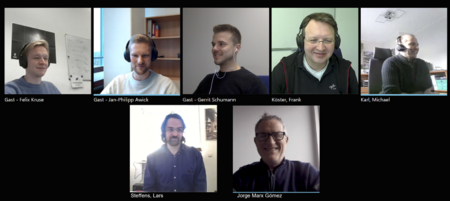
Am Donnerstag, den 09.02.2023, fand das Kickoff Meeting zum Projekt CoLDa (Collaborative Machine Learning for Data Value Creation) statt. CoLDa ist eine Forschungskooperation zwischen dem DLR (Deutsches Zentrum für Luft- und Raumfahrt) und der Abteilung VLBA (Very Large Business Applications) der Carl von Ossietzky Universität Oldenburg. Das Ziel des dreijährigen Projekts besteht in der praxisnahen Erforschung und Weiterentwicklung von Federated Machine Learning im Einsatzgebiet der Datenintegration sowie der natürlichen Sprachverarbeitung (Natural Language Processing, NLP). Im Rahmen des Kickoff-Meetings wurden unter anderem die Organisations- und Projektstruktur sowie die Konkretisierung der Zusammenarbeit und die externe Kommunikation besprochen.
10.02.2023: mOOWVe closing event
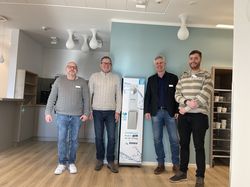
As part of the research cooperation project "Mobility management in rural areas using the example of a water supplier - mOOWVe" between the OOWV and the University of Oldenburg (Wirtschaftsinformatik-VLBA), the closing event took place on 07.02.2023 at the OOWV in Brake. Participants (from left to right): Stefan Hemme, Jorge Marx Gómez, Jens Schmikale and Cedrik Theesen.
26.01.2023: Neues Zukunftlabor Wasser
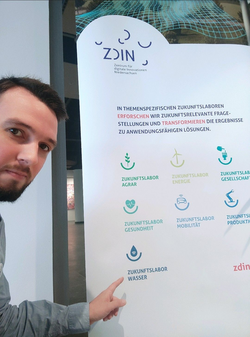
Das Zentrum für digitale Innovationen Niedersachsen (ZDIN) ist um ein Zukuftslabor reicher. Im ZUKUNFTSLABOR WASSER wird die Abteilung Wirtschaftsinformatik/VLBA der Carl von Ossietzky Universität Oldenburg am Einsatz intelligenter Systeme und neuer digitaler Methoden im Wassermanagement forschen und netzwerken. Wir konnten auch den Oldenburgisch-Ostfriesischer Wasserverband (OOWV) als Praxispartner gewinnen.
Zentrale Aspekte des Zukunftslabors Wasser sind der Einsatz intelligenter Systeme und neuer digitaler Methoden im Wassermanagement im Hinblick auf die Versorgungs- und Qualitätssicherheit der Ressource Wasser. Hierzu zählen die Anwendungen von Machine Learning und Big Data Analytics im Bereich der Wasserwirtschaft, der Ausbau integrierter Sensorik und digital vernetzter Systeme für eine gesicherte, effektive Datenerfassung und die Möglichkeit der Verbesserung von Interoperabilität und Standardisierung sowie Optimierungsansätze aus modellbasierten Analysen.
25.01.2023: TIPP research project officially begins
On January 1st, 2023, the research project TIPP (Transparency in Pig Production) officially began, with participation from the University of Oldenburg, University of Göttingen, Veterinary School Hannover, OFFIS Institute, Thünen Institute and the Chamber of Agriculture of Lower Saxony. Yesterday, the grant for the project was handed over.
The main objective of TIPP is to improve traceability and transparency along the supply chain of pigs through the testing and development of blockchain-based systems. The project will focus on understanding the challenges and opportunities that blockchain technology presents for the pig industry, and will strive to develop solutions that can be applied in practice.
The research team is made up of experts from various fields such as veterinary medicine, IT, and agricultural economics, who will work together to address the complex challenges facing the pig industry today. The project will also involve collaboration with industry partners to ensure that the solutions developed are practical and can be easily implemented in real-world scenarios.
The TIPP project aims to improve the efficiency and effectiveness of the supply chain while ensuring food safety and traceability. The project will also provide valuable insights for other industries that are looking to implement blockchain technology in their supply chains.

